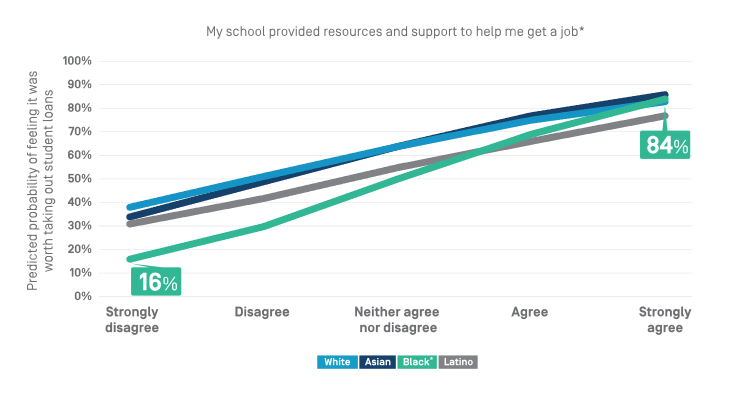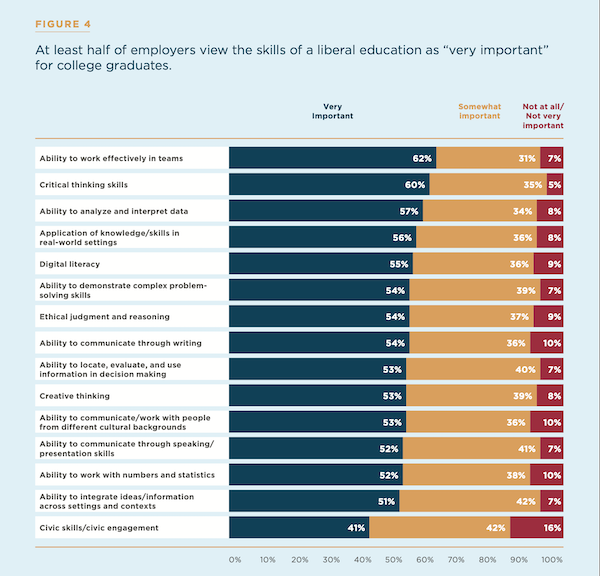Published on
Thinking About Adult Student Loans, Careers, and the Value of Liberal Arts Education

“We are currently preparing students for jobs that don’t yet exist…using technologies that haven’t been invented…in order to solve problems we don’t even know are problems yet.” This quote is often attributed to Richard Riley, Secretary of Education (1993-2001).
Strada Education just released a study of alumni views of student loans (Strada, 2021). Some of their findings are not surprising: students who don’t finish their degree programs report negative feelings toward their student loans, and the amounts of their loans have some bearing on how students feel. The finding that leaps out is that if students think the university did a good job of helping them prepare for and find a career, they feel positively about their loans.

This finding, however, does not mean that the majors were viewed as helpful in the students’ career options but that the university provided resources and support to help them get jobs.
At Loyola University Chicago (LUC), our strategy in the School for Continuing and Professional Studies from 2013 to 2018 was that no matter the direction that adult students took, our commitment was to prepare them well for their goal. In 2018, the adult students at LUC took on average two and a half years to complete their degrees. While this time frame gave us a fairly good view of the future job market, we were still doing exactly what Riley indicated: preparing students for an uncertain future.
We found that the adult students broke into groups—some wanted help with a new career direction, some wanted help moving forward in their current careers, and some had no specific goals but were interested in protecting themselves from an uncertain future. The only way for us to help them do this was to focus on developing knowledge, skills, and abilities (K/S/A) that are considered timeless (i.e. critical thinking, writing, and quantitative skills) and to specifically equip them to navigate the unclear shoals of a career they (we) could not foresee.
At LUC, we tackled this task with strategies that were fully supported by tuition revenue or low in cost. Early in the degree completion process, we required a Professional Identity and Development (PID) course to help students clarify their career goals and develop useful strategies to accomplish them. “This course engages students in exploration of their self-perception and the ways in which they are perceived by others, especially the workplace. The course continues to consider both the development of personal goals and consistent feedback for positive change.” (LUC SCPS, 2021)
Throughout their studies at LUC, adult students were offered a variety of career development options. Mock interview nights, workshops on getting promoted, individualized resume support and adult-focused internships were all regularly available.
The PID course introduces a portfolio requirement for graduation. In this portfolio, adult students add specific examples of the K/S/A they had developed in the degree completion process, so they could use these examples in developing their careers (i.e., applying for jobs and/or promotions). They present this portfolio as part of their capstone course.
The capstone course mandates that adult students creatively solve a real-world problem. Creative problem-solving is a skill that employers often seek, along with the K/S/A, that the LUC degree tried to develop: effective communication, teamwork, application in real-world settings and more.
The AAC&U recently released a study of employer attitudes toward higher education (AAC&U, 2021), and it found that the skills and attitudes developed in liberal education are highly desirable.

What LUC has been doing is strongly supported by this survey.
Employers were asked if they are more likely to hire a graduate if they had a set of experiences in their degree program, and it found that a portfolio of work showcasing skills and integrating college experiences makes 89% of employers more willing to hire. The LUC capstone is “a global learning experience that included exposure to diverse experiences and perspectives and application of learning to their major and their own life,” and this capstone makes 84% of employers more willing to hire. At least 83% of employers are more willing to hire if a student has “multiple courses requiring significant writing assignments,” and this perfectly captures the LUC requirements.
Adult students already bring work experience to the job market and have a leg up on traditional age students, but they need help with specific strategies to develop or advance their careers.
It is interesting to scan the views of employers. In the AAC&U study, the abilities to adequately build technical skills for employment and provide students with a well-rounded education were both equally important to employers (92%). This shows the need for institutions of higher learning to provide the technical and data skills that the modern workplace requires for all graduates, as well as the K/S/A contributions of liberal arts education. A re-conceived general education program teaches Excel as well as Euripides.
This speaks to our colleagues from the liberal arts who despair over the over-credentialled nature of higher education. Career support and liberal arts education that matter to our students, not a job-oriented major that is, almost certainly, not as current as employers would prefer. This is not an argument for doing away with management, IT or other like majors but an argument for strengthening career support and liberal education.
Conclusion
Students with loans are much likelier to view their loans favorably if they believe that the university has supported them in getting jobs to pay them off. We need to provide direct career support and make sure that the content of the major and the general education requirements are meticulously organized toward supporting eventual career choices. It is vital to make the knowledge, skills, and abilities the students have developed in their degree program and their life more visible.
References
AAC&U, 2021. Retrieved from https://bit.ly/3dOxeyn
Loyola University Chicago, 2021. Retrieved from https://bit.ly/3uEDBex
Strada Education Network, 2021. Retrieved from https://bit.ly/3wxJgVk
Disclaimer: Embedded links in articles don’t represent author endorsement, but aim to provide readers with additional context and service.
Author Perspective: Association



